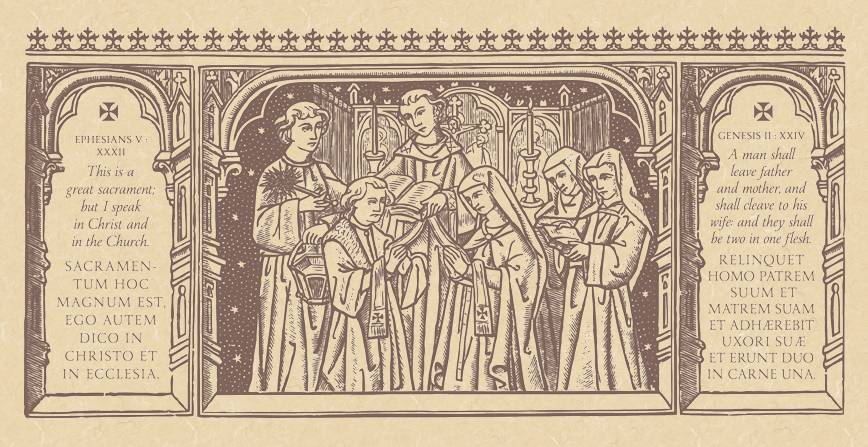Whom are We Trying to Impress, Anyway?
The Nineteenth Friday of Ordinary Time; or, the Memorial of Saint Jane Frances de Chantel, Religious.
Lessons from the secondary feria, according to the ordinary form of the Roman Rite:
• Ezekiel 16: 1-15, 60, 63 (or 16: 59-63).
• [Responsorial] Isaiah 12: 2-6.
• Matthew 19: 3-12.
|
…or, from the proper:
• Proverbs 31: 10-13, 19-20, 30-31.
• Psalm 131: 1-3.
• Mark 3: 31-35.
…or, any lessons from the common of Holy Men & Women.
|
The Third Class Feast of Saint Clare, Virgin.*
Lessons from the common "Dilexísti…" of a Virgin not a Martyr, according to the extraordinary form of the Roman Rite:
• II Corinthians 10: 17-18; 11: 1-2.
• Psalm 44: 5, 15-16.
• Matthew 25: 1-13.
The Second Friday of the Dormition Fast; a Postfestive Day of the Transfiguration; and, the Feast of the Holy Martyrs Photius & Anicetus.**
Lessons from the pentecostarion, according to the Ruthenian recension of the Byzantine Rite:
• II Corinthians 11: 5-21.
• Mark 4: 1-9.
FatherVenditti.com
|
 10:10 AM 8/12/2016 — It’s either ironic or providential or both that this Gospel lesson is read today, in which our Lord provides one of many Scriptural verifications for both religious chastity and priestly celibacy along with the Divine prohibition on divorce, especially since—purely by coincidence—it is the Memorial of Saint Jane Frances de Chantel, who lived both the vocations of marriage and religious life. This widowed mother of six children who died in 1641, after her husband’s death, dedicated herself to the sick and the poor, during which time she met Saint Francis de Sales; and, under his direction, founded a contemplative community of nuns called the Order of the Visitation. It was a member of this community, Saint Margaret Mary, who, many years later, had visions of our Lord in the manifestation of His Most Sacred Heart, leading to the establishment of that feast; and, I’ve told you a couple of times how my home parish in Maryland came to be named after the founder of the Visitation Sisters, and how I came to grow up with great devotion to Saint Jane de Chantel, Saint Margaret Mary and the Sacred Heart of our Lord. 10:10 AM 8/12/2016 — It’s either ironic or providential or both that this Gospel lesson is read today, in which our Lord provides one of many Scriptural verifications for both religious chastity and priestly celibacy along with the Divine prohibition on divorce, especially since—purely by coincidence—it is the Memorial of Saint Jane Frances de Chantel, who lived both the vocations of marriage and religious life. This widowed mother of six children who died in 1641, after her husband’s death, dedicated herself to the sick and the poor, during which time she met Saint Francis de Sales; and, under his direction, founded a contemplative community of nuns called the Order of the Visitation. It was a member of this community, Saint Margaret Mary, who, many years later, had visions of our Lord in the manifestation of His Most Sacred Heart, leading to the establishment of that feast; and, I’ve told you a couple of times how my home parish in Maryland came to be named after the founder of the Visitation Sisters, and how I came to grow up with great devotion to Saint Jane de Chantel, Saint Margaret Mary and the Sacred Heart of our Lord.
Regarding our Lord’s instruction itself, it’s quite clear from the narrative, as it is to common sense, that not everyone is called to a celibate life; and, even if one was prone to debate the value of priestly celibacy in today’s world—and I am not one of those—it’s instructive see this Gospel lesson paired with the one from Ezekiel, in which the holy Prophet describes an unfaithful Jerusalem as a young woman too captivated by her own charms, flirting with every passing fancy:
But you were captivated by your own beauty, you used your renown to make yourself a harlot, and you lavished your harlotry on every passer-by, whose own you became (Ez. 16: 15 RM3).
It’s not so much about chastity or celibacy or holy purity—except by analogy—as it is about the need to avoid what the spiritual doctors describe as “human respect”: conducting our affairs and styling our outward manner so as to be respected by others, even those who do not share our faith. When we do it ourselves we run the risk of side-tracking our eternal salvation for the sake of getting along and fitting in; when it’s done by the Church—such as when the Church takes on secular causes like the environment, thinking that doing so will cause the non-believing strata of society to look upon the Church more favorably—it only serves to confuse and demoralize the faithful.
To live in the midst of this world without being a part of it; to pace out the course of our lives as pilgrims whose journey does not end except in heaven: that is the faith that Jesus challenges us to embrace. There isn't one of us here who hasn't failed to embrace that faith at some point in his or her life; but, thanks be to God, we have a Savior who understands our human condition because He became one. He took our sins upon Himself, and offered Himself as a sacrifice on the altar of the Cross, a sacrifice which we will have reproduced for us upon this altar, and the broken Body of our God will again be offered to us to adore and receive in Holy Communion. That is a great grace, and one that can overcome all our lack of faith, if we will only dispose ourselves to allow it, and replace in ourselves the desire to be accepted with the desire to be saved.

* In the ordinary form, St. Clare was commemorated yesterday.
** Photius and Anicetus were martyred in Nicomedia in 305.
|

